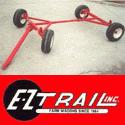 |
 |

|
|
|
Iowa Ag News Headlines |
 |
New Engineering Dean Follows 'Mission First, People Always'
Iowa Ag Connection - 09/17/2020
Harriet Nembhard's research has taken a multidisciplinary approach to manufacturing and health care systems engineering, and this multidisciplinary approach also is evident when she discusses her personal life. She exercises by practicing both the quiet stillness of yoga and the controlled forcefulness of martial arts, and she and her husband (also an industrial engineer) have used engineering principles to teach their three daughters about equity.
"When the girls were little, they each had two specific colors of eggs to find for Easter egg hunts," says Nembhard. "The oldest had the colors that were well hidden, the middle had the colors that were a little easier to find, and the youngest had the colors that were nearly out in the open. This is a homespun version of capacity planning. Now that they are older, they can also use this experience to explain the difference between equitable versus equal treatment."
Nembhard is the new dean of the University of Iowa College of Engineering and also serves as the Roy J. Carver Professor of Engineering and Professor of Industrial Engineering.
Nembhard came to Iowa from Oregon State University, where she was the head of the School of Mechanical, Industrial, and Manufacturing Engineering and the Eric R. Smith Professor of Engineering. Her career in academia began in 1994 when she taught at Auburn University in Auburn, Alabama, and it took her to the University of Wisconsin--Madison, the prestigious ecole Centrale Paris, and Penn State University at University Park, Pennsylvania, where she assumed leadership positions for the Center for Integrated Healthcare Delivery Systems, the National Science Foundation Center for Health Organization Transformation, and the Clinical and Translational Science Institute, among others.
As dean of the College of Engineering, Nembhard oversees a variety of programs, departments, centers, and institutes that support an undergraduate student body of 2,200 students along with 110 faculty, 85 staff, 280 graduate students, and more than 15,000 alumni. The college has a deep commitment to interdisciplinary collaboration and generates over $50 million in annual research expenditures.
Nembhard's father was a captain in the U. S. Air Force. She encapsulates her approach to leadership by borrowing the familiar military motto "Mission first, people always" and adapting it to higher education.
"'Mission first' means that we invest in the academic institution that we want to realize--as driven by our strategy and represented in our infrastructure, procedures, and systems," says Nembhard. "'People always' means that we prioritize the success and well-being of everyone in our community. We attract students, faculty, and staff and develop them in an environment where all can thrive, and we engage every stakeholder, alum, and friend as partners in our journey. I believe that putting these together--mission first, people always--propels us forward as a community of inclusive excellence."
What challenges and opportunities do you see in the future of engineering education, and how does that inform your vision for Iowa?
The global trends in engineering education include delivering on a student-centered curriculum that is socially relevant and partnering with government, industry, and philanthropic organizations to strategically invest in this effort.
Addressing the first trend of a socially relevant, student-centered curriculum means emphasizing the societal impact of the engineering discipline in a way that gives the student choices and experience outside the classroom and truly integrates with other disciplines--especially in arts and humanities, social sciences, and medicine and health sciences.
In terms of student choice, I don't just mean course A versus B. I mean that a wide range of students' prior paths, K--12 experiences, and life goals can be broadly accommodated in becoming an engineer. We will only be able to deliver on the engineering workforce of the future if we educate students from a broad spectrum of backgrounds.
This leads to the second trend of partnerships, which are essential for gaining the needed investment in engineering education. Governments and industries are seeing the strategic value in leveraging engineering education as an incubator for developing the talent that will build the creative systems- and technology-based solutions to serve humanity.
How would you describe your leadership style?
I lead most naturally by facilitating communication. Sometimes this is done through bringing needed conversations to the fore and sometimes through building productive coalitions. A line people hear from me time and again is that email is for confirmation, not conversation. When there are issues that need to be addressed, let's have an actual discussion on how we can move forward positively. For more complex matters, it is often the case that building a critical mass of support through formal and informal coalitions can help bring about lasting changes for the better.
At either level, communicating is about engaging others, providing a vision, and involving or empowering them in the outcomes. Through my communications, I want to make clear that I expect our team to operate with high degree of both autonomy and accountability, and that I am here to serve and support in the interest of creating a better future for our organization.
You are a member of several national organizations dedicating to advancing women within the field of engineering. What have you done in previous positions to advance diversity, equity, and inclusion (DEI), and what will your approach be here at Iowa?
In 2018, I had been at Oregon State as a school head for about two years. During that time, there was significant progress on DEI using a National Science Foundation ADVANCE model to build greater accountability for DEI into the annual review, promotion, and tenure processes.
In parallel, I started a research inquiry in engineering education. As I was doing my literature review, I was introduced to the work of Etienne Wenger, who defines a community of practice as a group of people who 'share a concern or a passion for something they do and learn how to do it better as they interact regularly.'
I thought, 'That's what I need--a group of other department chairs who have a passion for leadership, are committed to DEI, and want to learn how to deepen that commitment and get better at it by being interlocutors.' I convened the Community of Practice on Strategic Diversity Leadership as a group of 10 chairs from six colleges. Our project examined the role of department chairs in fostering DEI learning outcomes and student identity development. We also explored how chairs work with faculty to develop DEI action plans, how chairs develop DEI-focused partnerships with the upper administration, and how chairs can support Black Lives Matter in the academy. This deep dive fueled our work as leaders.
Here, my approach will be similar in that my leadership team and I are rolling up our sleeves and doing the hard, sometimes self-critical examinations of our past performance and building evidence-based plans to close gaps. Over the coming weeks and months, as we put these plans to work, there will be progress in creating the community we wish to become.
What is life outside of work like? What do you like to do for fun? Do you have any hobbies or favorite pastimes?
For fun, I enjoy traveling--whether it be attractions close to home or big cities far away--and I'm sure those days will return! So far, I've visited 40 of the United States, several Caribbean islands, and 10 other countries. Now, you might also see me riding my bike around campus on the weekend or taking a walk in City Park.
As for pastimes, I enjoy listening to classic R&B and jazz music--especially live. I really enjoy dancing and have tried many forms, from years of ballet as a youngster to tap, ballroom, hula, and African dance over the years. I have recently returned to doing a bit of yoga and using the freestanding bag I've had since studying martial arts. On most mornings, I'm sipping Jamaican Blue Mountain Coffee by 5:30 a.m. and get at least 20 minutes of exercise in our home gym before my very full days begin.
|
 |


|
 |
|
Copyright © 2024 - Farms.com. All Rights Reserved. |
 |
|